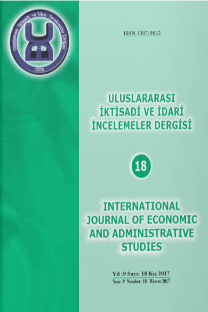İKİ PARAMETRELİ RAYLEIGH DAĞILIMLARININ SONLU KARMALARINDA PARAMETRE TAHMİNİ
İki Parametreli Rayleigh Dağılımı, Karma Dağılımlar, En Çok Olabilirlik Yöntemi, E-M Algoritması
PARAMETER ESTIMATION IN FINITE MIXTURES OF TWO-PARAMETER RAYLEIGH DISTRIBUTIONS
Two-Parameter Rayleigh Distribution, Mixture Distributions, Maximum Likelihood Method, E-M Algorithm,
___
- Açıkgöz, İ. (2007). Sonlu Karma Dağılımlarda Parametre Tahmini. (Yayımlanmamış Doktora Tezi). Ankara Üniversitesi Fen Bilimleri Enstitüsü, Ankara.
- Afify, W. M. (2011). Classıcal Estimation of Mixed Rayleigh Distribution in Type I Progressive Cen-sored. Journal of Statistical Theory and Applications, 10(4), 619-632.
- Dempster, A. P., Laird, N. M., ve Rubin, D. B. (1977). Maximum likelihood from incomplete data via the EM algorithm. Journal of the royal statistical society. Series B (methodological), 39(1), 1-38.
- Dey, S., Dey, T. ve Kundu, D. (2014). Two-parameter Rayleigh distribution: different methods of estimation. American Journal of Mathematical and Management Sciences, 33(1), 55-74.
- Dick, N. P. ve Bowden, D. C. (1973). Maximum likelihood estimation for mixtures of two normal distributions. Biometrics, 29(4), 781-790.
- Elmahdy, E. E. ve Aboutahoun, A. W. (2013). A New Approach for Parameter Estimation of Finite Weibull Mixture Distributions for Reliability Modeling. Applied Mathematical Modelling, 37(4), 1800-1810.
- Everitt, B. S. ve Hand, D. J. (1981). Finite Mixture Distributions. London: Monographs on Applied Probability and Statistics. Chapman and Hall.
- Gupta, R. D. ve Kundu, D. (2003). Discriminating Between Weibull and Generalized Exponential Distributions. Computational statistics & data analysis, 43(2), 179-196.
- Leytham, K. M. (1984). Maximum likelihood estimates for the parameters of mixture distributions. Water resources research, 20(7), 896-902.
- Liu, Z., Almhana, J., Choulakian, V. ve McGorman, R. (2006). Traffic modeling with gamma mixtures and dynamical bandwidth provisioning. Communication Networks and Services Research Conference, 123-130, Canada.
- McLachlan, G. J. ve Krishnan, T. (1997). The EM Algorithm and Extensions, (2nd ed.). Canada: Wiley series in probability and statistics.
- Pearson, K. (1894). Contributions to the mathematical theory of evolution. Philosophical Transac-tions of the Royal Society of London. 185(A), 71-110.
- Proschan, F. (1963). Theoretical Explanation of Observed Decreasing Failure Rate. Technometrics, 5(3), 375-383.
- Sum, S. T. ve Oommen, B. J. (1995). Mixture decomposition for distributions from the exponential family using a generalized method of moments. IEEE transactions on systems, man, and cybernetics, 25(7), 1139-1149.
- Wang, Y. ve Wang, J. (2014). The EM Algorithm for The Finite Mixture of Exponential Distribution Models. Int. J. Contemp. Math. Sciences, 9(2), 57-64.
- ISSN: 1307-9832
- Yayın Aralığı: Yılda 4 Sayı
- Başlangıç: 2008
- Yayıncı: Kenan ÇELİK
KIŞ TURİZM MERKEZİ SEÇİMİ İÇİN KRİTER AĞIRLIKLARININ BULANIK AHP KULLANILARAK BELİRLENMESİ
VIKOR VE MOORA YÖNTEMLERİ İLE MALZEME TAŞIMA SİSTEMİ SEÇİM
Sevde Dilruba KARAYEL, H Ediz ATMACA, Cemre YALÇIN, Burçak EROL
İrem EFE, Esin FİRUZAN, Berhan ÇOBAN
UÇAK SEFERLERİNDEKİ RÖTARLARI ETKİLEYEN FAKTÖRLERİN ANALİZİ
Aslı ÇALIŞ BOYACI, Korel İnanç DURMAZ, Cevriye GENCER
GEOMETRİK SÜREÇ VERİLERİ İÇİN GAMMA VE WEİBULL DAĞILIMLARI ARASINDAKİ AYRIM
Cenker BİÇER, Hayrinisa DEMİRCİ BİÇER
BAŞLIK YENİ ÜRÜNÜN BASS DİFÜZYON MODELİ İLE SATIŞ ÖNRAPORLAMASI
Mustafa SEVÜKTEKİN, Tuğba YILMAZ, Melih KARA
TÜRKİYE’DE HANEHALKI TÜKETİM VE GIDA HARCAMALARININ KANTİL REGRESYON YÖNTEMİYLE ARAŞTIRILMASI
Özlem Kiren GÜRLER, Şenay ÜÇDOĞRUK BİRECİKLİ, Arzu KÖKEN ERYAVUZ
